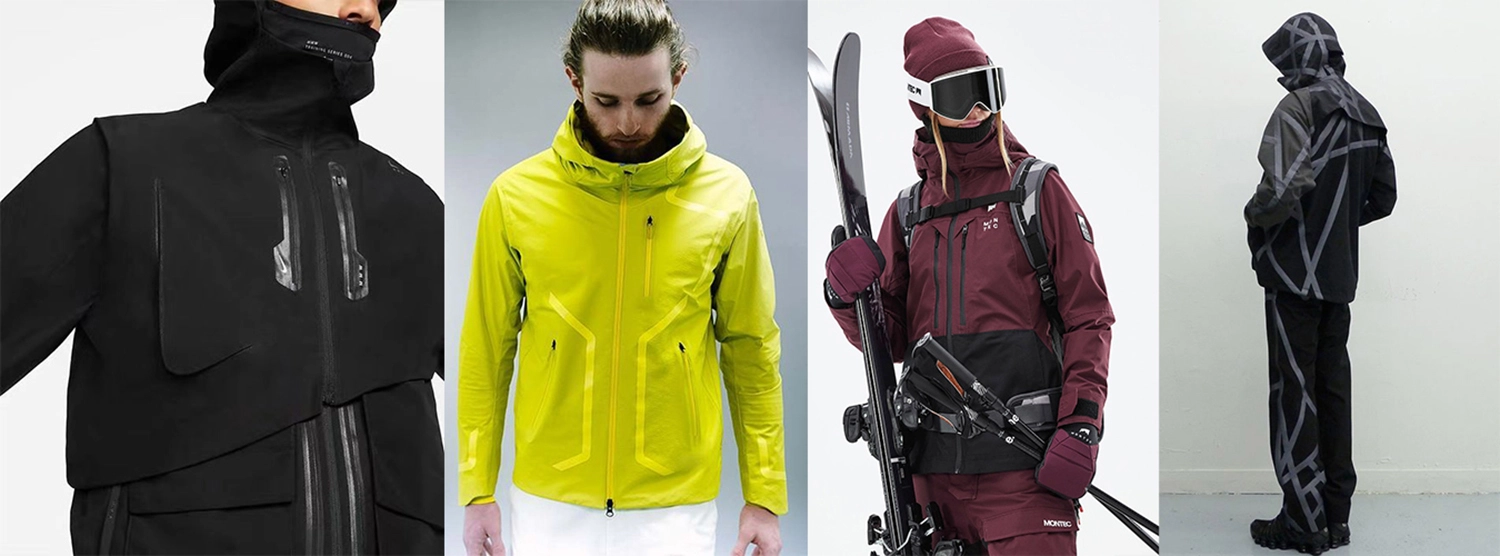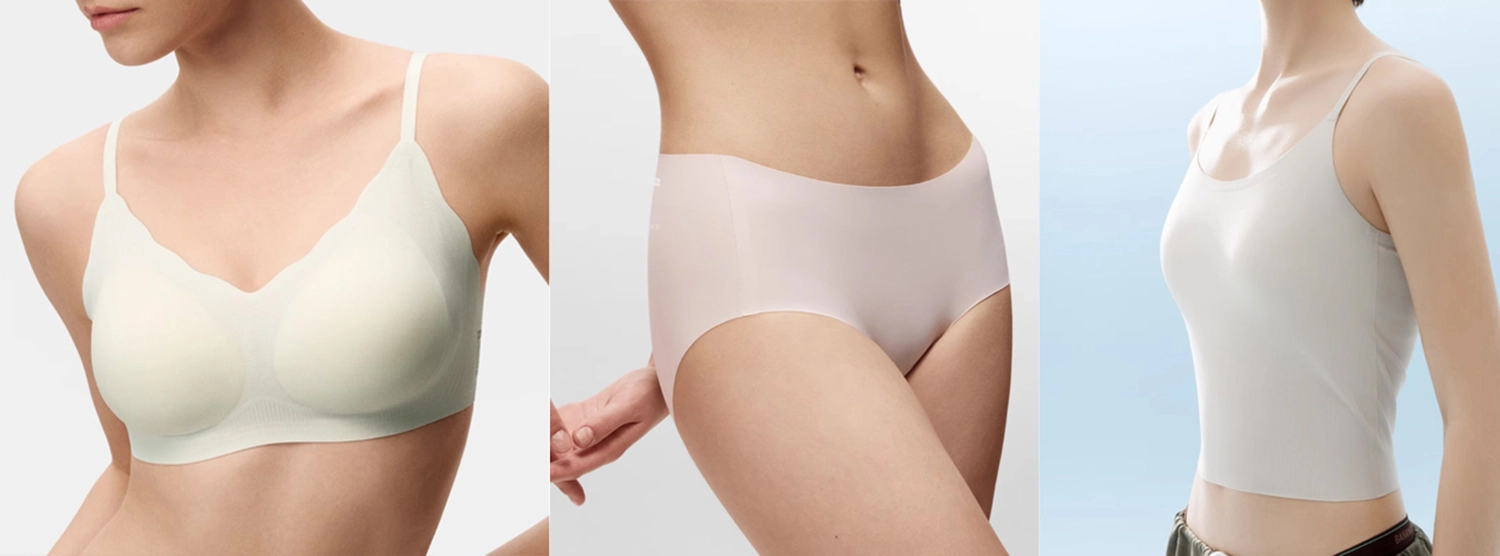OEM
Our OEM services shine for advanced tech, competitive pricing, fast turnaround, and clear communication. You set the vision, we'll craft diverse seamless apparel to your market needs, all meeting international standards.


ODM
Our ODM service offers a complete solution-from design and development to prototyping and production-powered by years of industry expertise in seamless apparel.
Thermal Bonding Garments
Thermal bonding garments use double-sided adhesive tape and heat pressing to join fabrics, replacing traditional stitching. With no visible seams or loose threads, they reduce skin friction, making them ideal for sports and functional wear. Laser cutting ensures clean, smooth edges and refined finishes, enhancing both appearance and comfort. These garments offer a sleek, modern look with a unique texture, and are widely used in sportswear, outdoor gear, functional apparel, and some fashion lines — growing rapidly in popularity.


Heat Sealing Garments
Heat-sealing garments use single-sided adhesive tape, melted and bonded to the back of seams to create a waterproof seal. Commonly used in hardshells, softshells, windbreakers, raincoats, and protective gear, this technique combines tape sealing with waterproof and stain-resistant fabrics. It’s now a standard in semi-seamless garment construction, as stitching is still used on the outer side.
Ultrasonic Welding Garments
Ultrasonic welding garments are made using high-frequency sound waves (>20kHz) to fuse materials without stitching. Common in seamless garments, sportswear, and lingerie, this technique offers: 1. Seamless comfort – Smooth, stitch-free finish; 2. Enhanced durability – Strong, reliable bonds; 3. Efficiency – One-step bonding and sealing reduces time and cost.


Seamless Knitting Garments
Seamless knitting garments, developed from Italian Santoni technology, uses programming, pattern design, yarn blending, and dye finishing to achieve 360° 3D one-piece knitting on specialized machines, followed by garment processing. Widely used in base layers, sportswear, yoga wear, and lingerie, it offers high efficiency, diverse styles, and design flexibility in structure, texture, and color - enabling zoned aesthetics and functional compression.
Glue Dot Bonded Garments
Glue dot bonded garments are mainly used in seamless lingerie production. Glue dots are precisely applied to fabric pieces via automated machines, then heat-pressed to bond the materials. Key advantages include: 1. Ultra-light, spaced glue dots offer a softer, skin-friendly touch and reduce friction for improved comfort; 2. Strong, durable bonds that resist peeling or delamination; 3. Automated control reduces glue usage, lowers bonding costs, and boosts production efficiency.


Mixed Seamless Garments
We offer a variety of hybrid seamless garments. Classified by process type, garments that incorporate two or more seamless special processes are called Mixed Seamless Garments. When classified by the proportion of traditional sewing areas to seamless process areas, apparel can be divided into: partially seamless garments and semi-seamlessgarments, which are also the main categories of hybrid seamless garments.
OEM
Our OEM services shine for advanced tech, competitive pricing, fast turnaround, and clear communication. You set the vision, we'll craft diverse seamless apparel to your market needs, all meeting international standards.

ODM
Our ODM service offers a complete solution-from design and development to prototyping and production-powered by years of industry expertise in seamless apparel.

Thermal Bonding Garments
Thermal bonding garments use double-sided adhesive tape and heat pressing to join fabrics, replacing traditional stitching. With no visible seams or loose threads, they reduce skin friction, making them ideal for sports and functional wear. Laser cutting ensures clean, smooth edges and refined finishes, enhancing both appearance and comfort. These garments offer a sleek, modern look with a unique texture, and are widely used in sportswear, outdoor gear, functional apparel, and some fashion lines — growing rapidly in popularity.

Heat Sealing Garments
Heat-sealing garments use single-sided adhesive tape, melted and bonded to the back of seams to create a waterproof seal. Commonly used in hardshells, softshells, windbreakers, raincoats, and protective gear, this technique combines tape sealing with waterproof and stain-resistant fabrics. It’s now a standard in semi-seamless garment construction, as stitching is still used on the outer side.

Ultrasonic Welding Garments
Ultrasonic welding garments are made using high-frequency sound waves (>20kHz) to fuse materials without stitching. Common in seamless garments, sportswear, and lingerie, this technique offers: 1. Seamless comfort – Smooth, stitch-free finish; 2. Enhanced durability – Strong, reliable bonds; 3. Efficiency – One-step bonding and sealing reduces time and cost.

Seamless Knitting Garments
Seamless knitting garments, developed from Italian Santoni technology, uses programming, pattern design, yarn blending, and dye finishing to achieve 360° 3D one-piece knitting on specialized machines, followed by garment processing. Widely used in base layers, sportswear, yoga wear, and lingerie, it offers high efficiency, diverse styles, and design flexibility in structure, texture, and color - enabling zoned aesthetics and functional compression.

Glue Dot Bonded Garments
Glue dot bonded garments are mainly used in seamless lingerie production. Glue dots are precisely applied to fabric pieces via automated machines, then heat-pressed to bond the materials. Key advantages include: 1. Ultra-light, spaced glue dots offer a softer, skin-friendly touch and reduce friction for improved comfort; 2. Strong, durable bonds that resist peeling or delamination; 3. Automated control reduces glue usage, lowers bonding costs, and boosts production efficiency.

Mixed Seamless Garments
We offer a variety of hybrid seamless garments. Classified by process type, garments that incorporate two or more seamless special processes are called Mixed Seamless Garments. When classified by the proportion of traditional sewing areas to seamless process areas, apparel can be divided into: partially seamless garments and semi-seamlessgarments, which are also the main categories of hybrid seamless garments.


